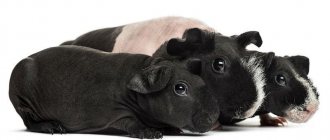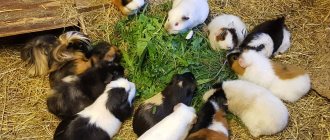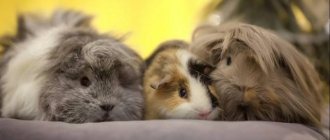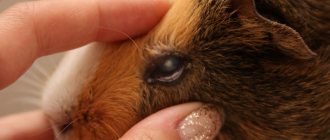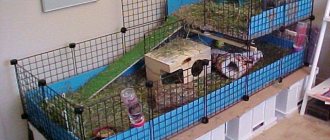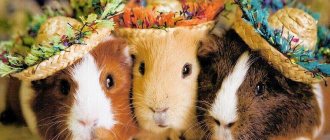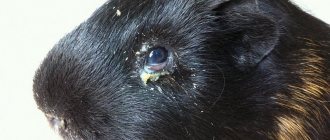In our previous article, we talked in detail about how guinea pigs behave with their relatives and other pets in the apartment. Today we will talk about the behavior of guinea pigs towards people.
You shouldn’t be scared, you probably already realized that these cute fluffy rodents are quite loyal to people, quickly get used to their owner, know how to express their feelings, and in general are excellent friends for many years.
And, nevertheless, there are behavioral features of guinea pigs that any furry owner needs to know.
Personality of guinea pigs
Compared to other rodents, guinea pigs have a very calm disposition. They are not at all characterized by aggression. It takes a lot of effort for a guinea pig to bite a person.
The bite can be triggered by pain or fear. A sound that is too loud or sharp can frighten the animal, and careless movements can cause pain. Also, a pig may bite if your hands smell of something tasty, so we recommend that you wash your hands before you start playing.
On the other hand, if the guinea pig is behaving too passively, has lost its appetite or/and is yeasty, then it is possible that the guinea pig is already dying. You can still save her, or prevent the death of your pet.
Some breeders consider guinea pigs even somewhat phlegmatic. In addition, these animals can be clumsy, which causes affection.
Adaptation is very important in the life of guinea pigs; after acquiring an animal, he needs to set aside a couple of days to get used to it and not touch the animal. Having gotten used to the new home and smells, the animal will make contact without problems. If you manage to make friends with a guinea pig, you will notice that they will pay attention to your voice, so they can be taught simple commands.
To establish friendly relations, you need to:
- pick up an animal;
- show affection by stroking the animal;
- do not touch the animal if it is busy - eating, playing or resting;
- pay attention as often as possible.
By the way, many breeders note that guinea pigs are capable of making purring sounds when stroking them, vaguely reminiscent of a cat’s, thanks to which you can understand whether your pet likes such tenderness.
Despite their calm nature, guinea pigs are very social animals and will be incredibly happy to receive attention from their owner. These animals need communication, and from its lack they can even get sick. If your guinea pig is not given enough attention, they may begin to refuse food and become uninterested in toys.
If you cannot devote enough time to your pet, you should think about purchasing a pet. If you do not plan to have offspring, you can purchase an animal of the same sex; females get along very well with each other, but males of some breeds can make trouble, establishing leadership or dividing territory.
As for other pets, you should be concerned about the safety of the rodent and place the cage out of reach of other pets. It is advisable not to allow a cat or dog to observe the animal, as this can cause stress in the animal. After all, hearing the smell of the enemy, the pig will feel discomfort and constant danger.
It is also unacceptable to keep a guinea pig and, for example, a rabbit in the same cage. Each species has its own food preferences, which may be prohibited to the second.
Of course, there will be no unwanted offspring, but they can get into fights and not only injure each other, but also kill each other.
Guinea pig behavior
Many may doubt whether it is worth purchasing a guinea pig; doubts arise due to the seeming phlegmatic nature of these rodents, especially in comparison with other active relatives, for example, mice, who swarm around in a cage all day long. However, this opinion is wrong: these rodents can also be very active; it is enough to observe their life for some time.
A sense of security is very important to them. If the animal is comfortable, it will happily show its sociality and friendliness. If a pig has made friends with its owner while walking around the apartment, it will not look for somewhere to hide and will come out of a secluded place if called. Pigs can also attract attention to themselves, for example, by grabbing clothes or lightly biting a person. In addition, they can express their emotions through sounds. Over time, any breeder begins to understand the sounds of a pet: whether the animal is scared or, conversely, enthusiastic about something.
The most common sounds and their meaning:
- Rumbling is a sound accompanied by vibration that can signal that your pet is in a good mood. He talks about satiety or pleasure, for example, during stroking.
- Snorting may indicate that the rodent is interested in something.
- Crackling - a grumbling sound similar to tapping may indicate that the animal is flirting, showing interest and readiness to mate.
- Whining can signal that the animal is in pain. You should check it for damage: if there are no visible wounds or abrasions, observe the behavior of the animal and, if necessary, visit a veterinarian.
- Hissing or chirping can indicate aggression: perhaps the animal is frightened, afraid or anxious. You should find out why the animal was scared and eliminate the reason. At these moments, it is better not to touch the pet, it may bite.
- Whistling: this way the animal can talk about hunger. But if you hear rhythmic whistling and the animal is calm, it may just be eating. Some animals can make this sound when eating food.
- A loud, drawn-out squeak may also indicate pain or severe fright, for example, the animal could be stuck somewhere, causing pain to itself.
These rodents can be tamed in a short time, so they will be an excellent gift for a child. They will never bite when stroking or trying to be picked up; moreover, they are easy to catch when escaping - once in a new, uncharted territory, most likely the animal will simply freeze and remain in place.
It is important to know! When an animal clicks its teeth, it is better not to touch it: in this way they show aggression. Such movements can be noticed during quarrels with relatives or when the pig is in danger.
Hums
Rumbling sounds can have a variety of meanings, depending on the position you are currently occupying. If the pig is currently feeling content and happy, then it will emit a guttural rumbling against the background of absolute relaxation and ease. However, if the rumbling sounds have a higher pitch, then the animal is most likely irritated by something. Tension in movements will also indicate this. If you take a closer look at the pet, you can see that it trembles while purring. But abrupt rumbling sounds clearly indicate that your pig is scared or feels uncomfortable.
Guinea pig intelligence
Many people mistakenly believe that guinea pigs do not have intelligence - they do not understand what is happening, not to mention new skills. Undoubtedly, in comparison with a cat or dog, pigs are not capable of complex tricks or commands, but they are definitely capable of recognizing their owner.
If desired, they can be taught a few simple tricks without effort, for example, going out or entering the cage on command. Guinea pigs have a fairly well-developed memory, therefore, after a while, the rodent will respond to its name and easily distinguish the guest from the owner.
Guinea pigs perfectly understand the mood of people; they can behave differently with different people, showing friendliness towards some, and, on the contrary, wariness towards others. Moreover, the pig remembers its offenders and those who treat it friendly.
It is important to remember that a guinea pig, like a person, can have its own character, can be calm, or, on the contrary, can be very active.
In order for the animal to feel comfortable in its new home, you just need to clean the cage as it gets dirty, monitor food and water, and pay attention to it, then you will get a reliable friend who will give you a lot of positive emotions!
Squeals or whines
A squeal is a high-pitched squeak that unmistakably signals that your pet is feeling unwell and is overcome by fear and pain. If you hear this sound, be sure to check on your pets to make sure they are okay and no one was hurt. By whining or moaning, guinea pigs want to tell their owners about their irritation or dislike for something or someone, for example, their brothers.
Guinea pig facts
The very name “Guinea Pig” confuses many pet owners. And those who have simply heard about these cute creatures are surprised where such a nickname comes from, because the animals are clean and have nothing to do with the sea.
In fact, the origin of the name “Guinea Pig” owes to America. It was from there that the breed was brought, that is, as they said in Rus', the animal was “Overseas”.
Interestingly, in European countries the animal is often called “Guinea pig”, “Indian pig”, or “Pig mouse”. As you can understand, only the “Pig” part of the name does not raise any questions. Again, it all comes down to the characteristics of the animal: in everyday life they sometimes make grunting sounds, very reminiscent of an ordinary pig. This is where the animal got its name.
The inhabitants of the Andean system first began domesticating animals; this happened 5 thousand years ago. At that time, they played the role not only of pets, but were also considered ritual animals sacrificed. Some ate their meat.
Only in the 13th century did Indian tribes see promise in pigs, and by 1533 they were able to develop many interesting breeds.
Today, these animals are rightfully considered one of the most popular types of pets. Especially in families with small children.
Due to the fact that animals are easy to train and get used to being handled, at home they become real members of the family.
With proper care, pigs live a fairly long time.
Science today does not stand still, and breeders have managed to develop breeds that are not similar in appearance to each other. For example, the most common difference is in the length and color of the coat; there are even specimens without fur, which is not for everyone.
The body length of a guinea pig rarely exceeds 35 cm. They are distinguished by a wide muzzle with hanging ears, a round body and a complete absence of a tail. The maximum weight of males reaches 1.5 kg, females - 0.8 kg.
Individuals in the wild have a brownish-gray coat color on top, and the belly and inner side of the body are lighter in color.
Origin story
These animals have been domesticated since the 5th millennium BC. tribes of South America. The ancestors of the current inhabitants of southern Colombia, Peru, Ecuador and Bolivia are known to have eaten these mammals. Scientists believe that wild guinea pigs wanted to be around people without coercion. The Incas used guinea pigs as sacrificial animals, so they were constantly sacrificed to the sun god. Spotted brown or pure white animals were very popular. It is generally accepted that modern guinea pigs descended from their ancestors Cavia aperea tschudi, living in mountainous regions.
Guinea pig on the grass
Interesting to know! These mammals form small groups and live in fairly large underground burrows. Animals living in the mountains of Chile look completely different from domestic guinea pigs. This is because their food is low in water but rich in cellulose compounds.
38...interesting facts about guinea pigs
- Many note that these animals have little in common with pigs. Except for the body structure without a waist and sounds reminiscent of grunting. That's why they got their name. “Sea” means “Overseas”, since the animal was brought from America, an overseas country.
- The pigs' ancestors were several times larger in size and weighed up to 700 kg.
- For the Incas, pigs were a source of meat, which was considered valuable. For this reason, they began to breed and domesticate animals in the 5th millennium BC.
- And the people of the Mochica tribe, on the contrary, deified the animal, worshiped them and created various works of art on this topic.
- Even today, guinea pig delicacies are popular in the countries of Peru and Ecuador.
- The body length of the animal is 35 cm, and the weight of the male is 1.5 kg.
- Due to the peculiarities of the digestive system, pigs eat almost constantly; their main food is hay.
- Pigs eat their droppings, however, this process is considered vital for them. The fact is that vitamins K and B are absorbed by the body only by repeatedly passing through the digestive system.
- Pigs are considered one of the most tame pets. They respond to names and are also able to purr in response to the owner's stroking.
- If the pig is pregnant, it may sometimes make sounds reminiscent of birds chirping.
- The average lifespan of an animal is 5 years. But with proper care, the period can be extended.
- Guinea pigs mature a month after their birth.
- Penicillin is prohibited for animals , since their bodies will perceive the substance as poison.
- Animals' teeth grow throughout their lives. Therefore, it is important to give them food on which they can wear them down.
- With a certain dose of happy hormones, pigs can jump in place or stretch.
- The longest lifespan of a pig, recorded by the Guinness Book of Records, is 15 years.
- Animal DNA contains 64 chromosomes, which is 18 more than humans.
- If the animal “changes its mind” about becoming a mother, the cubs can either be preserved in the body for several years, or dissolve within it naturally.
- Pigs are able to sleep for 10 minutes several times during the day. The rest of the time they remain cheerful.
- Despite the marine name, animals do not like water.
- A pet can suffer from a fall even from a low height.
- Unlike a number of other rodents, pigs have the ability to distinguish colors.
- The maximum recorded length of pet fur is 50 cm.
- Pigs became known to Europe after the discovery of America by Columbus.
- There are no mechanisms in the pig's body responsible for the production of vitamin C.
- Despite the frighteningly long claws and teeth, pets practically do not scratch.
- Pigs are considered a musical type of animal. The fact is that they can produce the widest range of sounds of any known pet.
- If a pet stretches in your arms, this means the highest degree of his happiness.
- Thanks to the 4 curls in the inner ear, the animal's hearing is many times better than that of humans.
- The Land of the Rising Sun has a network of specialized stores with fashionable clothing and accessories for animals.
- Peru hosts an annual Guinea Pig Festival. The author of the most original costume receives the main and coveted prize.
- If there is a child with autism in the family, then a guinea pig will help reduce stress and adapt to special conditions.
- If an animal wants to demonstrate its strength, it throws its head up.
- In Europe, the first animals cost astronomical sums. And their owner automatically acquired the status of a rich person.
- But in South America, guinea pigs are considered symbols of general bad luck and failure.
- If there is a need to distract a predator, the pig can pass itself off as dead, automatically stopping the body's processes.
- The body of an adult animal does not digest lactose well.
- To reduce the stress level of guinea pigs, the Swedish authorities passed a law that prohibits keeping animals alone. In order for the law to come into force, the country has a special animal rental office.
Despite the animal’s well-fed body, pigs never cease to set world records, surprising breeders, scientists and the owners themselves.
Keeping at home
Spotted Guinea Pigs
Once an animal is captured, its behavior can be quite slow and unconvincing as the animal gradually becomes accustomed to its new environment. During this period, the guinea pig has a poor appetite, it is afraid of various movements and sounds, so it can sit motionless in one place for a long time. The adaptation process can and should be accelerated by creating a calm and attentive atmosphere in the house.
Cage, filling
Guinea Pig Cage
In fact, guinea pigs are considered to be quite shy by nature, which is why they react negatively to changes in their environment. Animals can be kept either in a terrarium or in a cage with a tray, the latter is preferable. The cage should be equipped with some kind of country (sleeping) house, as well as various game elements, a feeding trough and a drinking bowl. Naturally, the size of the chicken coop should take into account the size of the animal itself.
Care, hygiene
Caring for a guinea pig
Guinea pigs do not tolerate both cold and excessive heat in the form of direct sunlight, so it is necessary to protect the animal from these negative factors. Water treatments should be organized according to the needs of the guinea pig. The coat should be brushed once a week. Since nails are unlikely to shrink naturally, they should be trimmed once a week.
If an animal participates in exhibitions, it requires special attention. From the youngest For years, they need to be taught to sit quietly in one of the postures and patiently endure the daily process of brushing their teeth. In this case, the animal must withstand the process of applying the pin. Sea rabbits with coarse and smooth fur undergo periodic trimming.
What to feed
Three guinea pigs nibble on tasty green grass.
In the wild, guinea pigs eat plant components, including plant roots and seeds, leaves and fruits fallen from trees or shrubs. The basis of a guinea pig's diet is high-quality hay, which normalizes the functioning of the digestive system and also allows rodents to grind their teeth. Due to the specifics of the digestive system, hay should be given to animals quite often, but in small portions.
Attention! Experts recommend feeding guinea pigs with ready-made food, in an amount of no more than one tablespoon per day.
Of course, no one will feed a guinea pig exclusively with hay, so its diet should include juicy food in the form of berries, fruits and vegetables. Sweet fruits, berries and fruits from other crops can be offered as treats. To grind down permanent teeth, your guinea pig should be given cherry or apple sprigs, dandelion root or celery. Your guinea pig's cage should have fresh, clean water, which should be changed daily.
Guinea pigs are purely herbivores, so any animal products should be excluded from the diet. In addition, it is not recommended to feed guinea pigs milk, as this can lead to disturbances in the animal’s digestive tract, since its body is poor in digestive lactose. The consumption of low-quality feed, as well as frequent and, moreover, rapid changes in the diet, contribute to the development of various ailments, and often cause death.
Health, diseases and their prevention
The most common diseases that guinea pig owners may encounter are:
- Worms and external parasites.
- Alopecia or baldness, which occurs as a result of improper feeding of the animal, manifests itself in stress, lack of vitamins and minerals, and the appearance of parasites.
- Injuries and even fractures of limbs, which is associated with violation of maintenance rules.
- Rickets as a consequence of vitamin D deficiency.
- Colds (acute respiratory infections), pneumonia, inflammation of the ear and bladder as a result of hypothermia or drafts.
- Anomalies of dental incisors.
- Digestive system disorders. As a result, the animal develops diarrhea, constipation, gas or enteritis.
- Cornea and conjunctivitis as a result of infection, chemical and mechanical factors.
Improper nutrition (nutrition imbalance) leads to obesity in the animal, which does not lead to anything good.
Reproduction and offspring
At the age of six months you can start breeding guinea pigs. This process is possible within 2 weeks, with the possibility of fertilization within 8 hours. After the start of pregnancy, the female carries her future offspring for about 2 months.
In this way, from 2 to 5 cubs are born, which are well developed and move independently. Nurses feed the cubs for several months, but no longer.

